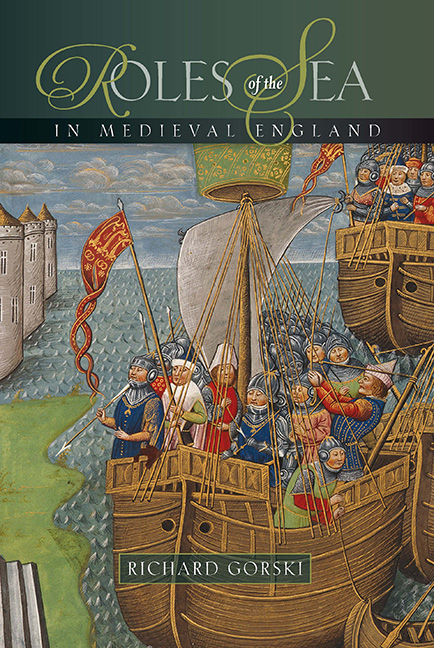Book contents
- Frontmatter
- Contents
- List of Contributors
- Map
- 1 Roles of the Sea: Views from the Shore
- 2 Changes in Ship Design and Construction: England in the European Mould
- 3 The Value of the Cinque Ports to the Crown 1200–1500
- 4 The Contribution of the Cinque Ports to the Wars of Edward II and Edward III: New Methodologies and Estimates
- 5 Keeping the Seas: England's Admirals, 1369–1389
- 6 The Cost-Benefit Analysis of a Fourteenth-Century Naval Campaign: Margate/Cadzand, 1387
- 7 Piracy and Anglo-Hanseatic Relations, 1385–1420
- 8 ‘Herring of Sligo and Salmon of Bann‘: Bristol's Maritime Trade with Ireland in the Fifteenth Century
- 9 How Much did the Sea Matter in Medieval England 167 (c.1200–c.1500)?
- Index
9 - How Much did the Sea Matter in Medieval England 167 (c.1200–c.1500)?
Published online by Cambridge University Press: 05 September 2016
- Frontmatter
- Contents
- List of Contributors
- Map
- 1 Roles of the Sea: Views from the Shore
- 2 Changes in Ship Design and Construction: England in the European Mould
- 3 The Value of the Cinque Ports to the Crown 1200–1500
- 4 The Contribution of the Cinque Ports to the Wars of Edward II and Edward III: New Methodologies and Estimates
- 5 Keeping the Seas: England's Admirals, 1369–1389
- 6 The Cost-Benefit Analysis of a Fourteenth-Century Naval Campaign: Margate/Cadzand, 1387
- 7 Piracy and Anglo-Hanseatic Relations, 1385–1420
- 8 ‘Herring of Sligo and Salmon of Bann‘: Bristol's Maritime Trade with Ireland in the Fifteenth Century
- 9 How Much did the Sea Matter in Medieval England 167 (c.1200–c.1500)?
- Index
Summary
This essay is about how much effect the sea, or the use of the sea, may have had on the development of medieval England. It also looks at the nature of maritime society in medieval England. The start-date of this study approximates to that of the loss of Normandy by King John in 1204, when England became much more of an ‘island’ in political terms. The essay ends at the period when regular European transoceanic voyages were beginning, a process that would transform both Europe and the rest of the world.
In one sense, the question posed by this essay has an obvious answer: the sea always matters to islands, and England is on an island. The English coast makes up roughly half of the total coastline of modern mainland Britain, and the proportion for the medieval kingdom would not have been vastly different. Despite its shifting land borders with Wales and Scotland, medieval England's longest frontier was with the sea.
England owed its existence to seaborne invasion and colonisation by the Anglo-Saxons, and the use of the sea had a profound impact upon the development of Anglo-Saxon and early Norman England. Many of the earliest Anglo-Saxon towns were seaports, pointing to a strong link between maritime trade and urban development, and between the ninth century and 1066 waterborne mobility facilitated the conquests of the Vikings and, later, the Normans. In the 140 years or so after the Norman Conquest, sea communication was part of the glue that held the cross-Channel Norman and Planta- genet empires together. If the period up to 1200 was one in which the sea was used to help shape England, the era after 1500 saw England, and later Britain, use the sea to re-shape the world. In the centuries between, was the sea quite so important to the country? What happened with England and the sea during the period in between?
England and the Sea: Physical Entities
In a very important sense, the sea made the Middle Ages possible for Britain and northwestern Europe. The Gulf Stream, bringing warmer water into the higher latitudes of the North Atlantic from the Gulf of Mexico, has ensured that these regions have had a broadly temperate climate for thousands of years, and continue to do so.
- Type
- Chapter
- Information
- Roles of the Sea in Medieval England , pp. 167 - 186Publisher: Boydell & BrewerPrint publication year: 2012



